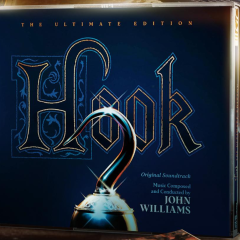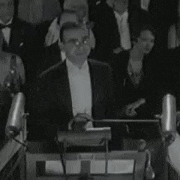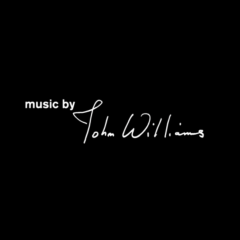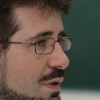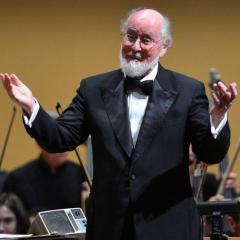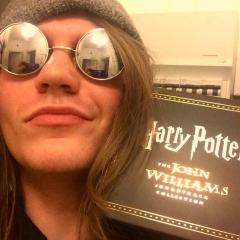-
Posts
6,218 -
Joined
-
Days Won
54
Reputation Activity
-
 TownerFan got a reaction from 1977 in Williams Non OST Concert Version Playlist and Where to Find the Tracks
TownerFan got a reaction from 1977 in Williams Non OST Concert Version Playlist and Where to Find the Tracks
They're all JW except Black Sunday, War of the Worlds and Earthquake.
The version of The Towering Inferno recorded by Lockhart (with the Finale segment tacked at the end) is at least acknowledged by JW, I think, as the album has his stamp of approval.
Both suites from The Patriot are by JW--the one by the FSO is the regular published Hal Leonard version; the one recorded by Lockhart is an arrangement JW did for a Boston Pops performance in 2000 (in an interview Lockhart said he remembered that version so he had people searching for it in the BSO library)
The Memoirs of a Geisha 5-mvt suite for cello and orchestra recording has been released on several different album (the Music from America 3-disc set), while the 3-mvt suite for cello and piano was released digitally on iTunes.
-
 TownerFan got a reaction from 1977 in Williams Non OST Concert Version Playlist and Where to Find the Tracks
TownerFan got a reaction from 1977 in Williams Non OST Concert Version Playlist and Where to Find the Tracks
The suite from War of the Worlds mentioned above is a collage of three cues unofficially transcribed by some arranger/orchestrator for some City of Prague recording released in 2005-6 (they used to do this quite a lot for their compilation albums, until they finally stopped). It circulated between orchestra librarians around Europe for some time and it has also been performed live a few times before it was asked to be removed.
The Williams-authored War of the Worlds concert suite (comprised of two movements, "I. Escape from the City" and "II. Epilogue") has never been published or recorded.
No, the Kunzel recording is a transcription (likely made by one of the Cincinnati Pops staff arrangers like Tim Berens or Steven Reineke) of the "Escape from the City" cue as heard on the soundtrack album, with an added short coda (not by JW). Considering the friendship between Kunzel and JW, I guess this was done with JW approval.
The Varèse Sarabande recording of The Poseidon Adventure main title as heard on The Towering Inferno and Other Disaster Classics (conducted by John Debney) was likely made from a loan of the original manuscript score stored at JAKMS, from which new parts were copied. Same goes for the selections from The Towering Inferno and Earthquake recorded for the same album. They sound faithful to the original versions (save for the occasional wrong note here and there) and no orchestration changes were made. Bob Townson has always been very careful to do these things with taste and awareness.
Keep in mind that many JW "rare" selections recorded on those Silva compilation album made in the late 90s/early 00s (including Black Sunday, Towering Inferno, The Rare Breed, Dracula etc) were indeed transcriptions made either by ear or from (often bootlegged) manuscript scores floating around. For some strange copyright law, these new transcriptions were passed as arrangements/cover version so that they could not be sued by the copyright owners.
-
 TownerFan reacted to Thor in JW Less Performed Music
TownerFan reacted to Thor in JW Less Performed Music
Indeed. I hope I get to a point in my life where I can host and arrange more concerts. I'm working on the first Nordic film music festival, after all. I have an idea for this, which is a jazz ensemble performing a string of rare, jazzy Williams pieces from the 50s and 60s (and perhaps some newer jazz things, like CATCH ME IF YOU CAN -- just to have a couple of familiar titles). But most of these would require new arrangements (like we did with BACHELOR FLAT and CHECKMATE), and that's both expensive and time-consuming.
-
 TownerFan got a reaction from bollemanneke in John Williams & the Vienna Philharmonic: January 18/19 2020
TownerFan got a reaction from bollemanneke in John Williams & the Vienna Philharmonic: January 18/19 2020
The version available on Hal Leonard is the full original version, luckily for us.
I believe this shorter version originated for the Star Wars In Concert tour back in 2009, where the piece was accompanying a montage of clips from the original six films. For some reason, JW stuck with it since then. For the Mutter violin arrangement however, he went back to the full version.
-
 TownerFan got a reaction from Jay in JW Less Performed Music
TownerFan got a reaction from Jay in JW Less Performed Music
When JW became Pops' principal conductor, he wisely decided to remain faithful to the traditon of the Pops concert programming, a.k.a. the three-act program that defined the Boston Pops standard. Williams started to put some of his own pieces into the programs (usually as part of the "showbusiness" third act of the concerts) since the very beginning of his tenure, but he was clever enough to avoid putting the spotlght on himself, so he did it very carefully and only seldomly. Some of the audience though came to the concerts and expected tos ee him conducting Star Wars and the likes, so he had to find a balance without taking anything away from the prestige post he was occupying. Once he gained more confidence (and also became more and more a reason of attraction for the very severe Bostonian audience), more of his own film pieces became part of the Pops standard, but he also started to write more music for the orchestra (for example the Tuba Concerto, written for the Pops principal tuba Chester Schmitz). Nonetheless, Williams avoided the Pops to become "the John Williams show", showing an immense respect to the orchestra's history and legacy.
From what I know, the now traditional "John Williams' Film Night" began in the late 1990s, when the Pops continued to use his starpower to bring a wider audience and Williams became more active as a conductor of his own music in concert. However, Williams programmed a few film night-type of concerts during his tenure at the Pops--in 1981 he brought Lionel Newman to conduct a full concert devoted to Hollywood's golden age scores; Marvin Hamlisch appeared several times throughout the JW years as guest conductor performing selections from his popular film works such as The Way We Were and A Chorus Line; Michael Kamen conducted a full film music concert that included a suite from Robin Hood Prince of Thieves and a couple of Williams' pieces.
As for performing his lesser-known works more often, it's my belief that Williams simply has preferences over his own works, as we all do, and that's it. Despite how highly we might think of some of his more obscure output, he's sensitive enought to avoid using his starpower to put the audience in front of something that might not be received as well as, let's say, the Raiders March, or the Cowboys Overture. Like every artist connected to his audience, Williams is sensitive about how they feel and react. Of course we also know the man is humble to the point of being almost self-deprecating, but as I said several other times, i think it's duty of the next generation of conductors and musicians to shed a light into his lesser-known scores. It bodes well that fellow conductors like Keith Lockhart and Richard Kaufman have been able to convince him to dust off the occasional hidden gem.
Williams conducted "Hell's Kitchen" from Sleepers also at Tanglewood in the summer of 1996.
Lockhart conducted "The Turbulent Years" from Nixon throughout the whole 2019 Pops season, including the annual "John Williams Film Night" (the composer didn't attend last year)
-
 TownerFan got a reaction from Fabulin in John Williams & the Vienna Philharmonic: January 18/19 2020
TownerFan got a reaction from Fabulin in John Williams & the Vienna Philharmonic: January 18/19 2020
Film music fans almost always see the original film recording as the epitome/ultimate reading of said piece. But we all know that the tempo is thoroughly dictated by the film in that case, so the composer might feel that the piece works better with a different tempo if presented in a concert setting. For Jurassic Park, Williams showed a tendency to prefer a slightly faster reading of the "brachiousaurus" segment since the first times he performed the piece in concert with the Pops:
Sometimes he conducted it faster, other times slower. The point is that he takes freedom in these things and probably doesn't have a rigid interpretation in his head. A lot of these things depend upon rehearsal time and how the orchestra responds to the piece. The great thing about music is that there is always more than one interpretation of a piece, and that includes film music cues as well.
-
 TownerFan got a reaction from KittBash in JW Less Performed Music
TownerFan got a reaction from KittBash in JW Less Performed Music
When JW became Pops' principal conductor, he wisely decided to remain faithful to the traditon of the Pops concert programming, a.k.a. the three-act program that defined the Boston Pops standard. Williams started to put some of his own pieces into the programs (usually as part of the "showbusiness" third act of the concerts) since the very beginning of his tenure, but he was clever enough to avoid putting the spotlght on himself, so he did it very carefully and only seldomly. Some of the audience though came to the concerts and expected tos ee him conducting Star Wars and the likes, so he had to find a balance without taking anything away from the prestige post he was occupying. Once he gained more confidence (and also became more and more a reason of attraction for the very severe Bostonian audience), more of his own film pieces became part of the Pops standard, but he also started to write more music for the orchestra (for example the Tuba Concerto, written for the Pops principal tuba Chester Schmitz). Nonetheless, Williams avoided the Pops to become "the John Williams show", showing an immense respect to the orchestra's history and legacy.
From what I know, the now traditional "John Williams' Film Night" began in the late 1990s, when the Pops continued to use his starpower to bring a wider audience and Williams became more active as a conductor of his own music in concert. However, Williams programmed a few film night-type of concerts during his tenure at the Pops--in 1981 he brought Lionel Newman to conduct a full concert devoted to Hollywood's golden age scores; Marvin Hamlisch appeared several times throughout the JW years as guest conductor performing selections from his popular film works such as The Way We Were and A Chorus Line; Michael Kamen conducted a full film music concert that included a suite from Robin Hood Prince of Thieves and a couple of Williams' pieces.
As for performing his lesser-known works more often, it's my belief that Williams simply has preferences over his own works, as we all do, and that's it. Despite how highly we might think of some of his more obscure output, he's sensitive enought to avoid using his starpower to put the audience in front of something that might not be received as well as, let's say, the Raiders March, or the Cowboys Overture. Like every artist connected to his audience, Williams is sensitive about how they feel and react. Of course we also know the man is humble to the point of being almost self-deprecating, but as I said several other times, i think it's duty of the next generation of conductors and musicians to shed a light into his lesser-known scores. It bodes well that fellow conductors like Keith Lockhart and Richard Kaufman have been able to convince him to dust off the occasional hidden gem.
Williams conducted "Hell's Kitchen" from Sleepers also at Tanglewood in the summer of 1996.
Lockhart conducted "The Turbulent Years" from Nixon throughout the whole 2019 Pops season, including the annual "John Williams Film Night" (the composer didn't attend last year)
-
 TownerFan got a reaction from Pieter Boelen in JW Less Performed Music
TownerFan got a reaction from Pieter Boelen in JW Less Performed Music
When JW became Pops' principal conductor, he wisely decided to remain faithful to the traditon of the Pops concert programming, a.k.a. the three-act program that defined the Boston Pops standard. Williams started to put some of his own pieces into the programs (usually as part of the "showbusiness" third act of the concerts) since the very beginning of his tenure, but he was clever enough to avoid putting the spotlght on himself, so he did it very carefully and only seldomly. Some of the audience though came to the concerts and expected tos ee him conducting Star Wars and the likes, so he had to find a balance without taking anything away from the prestige post he was occupying. Once he gained more confidence (and also became more and more a reason of attraction for the very severe Bostonian audience), more of his own film pieces became part of the Pops standard, but he also started to write more music for the orchestra (for example the Tuba Concerto, written for the Pops principal tuba Chester Schmitz). Nonetheless, Williams avoided the Pops to become "the John Williams show", showing an immense respect to the orchestra's history and legacy.
From what I know, the now traditional "John Williams' Film Night" began in the late 1990s, when the Pops continued to use his starpower to bring a wider audience and Williams became more active as a conductor of his own music in concert. However, Williams programmed a few film night-type of concerts during his tenure at the Pops--in 1981 he brought Lionel Newman to conduct a full concert devoted to Hollywood's golden age scores; Marvin Hamlisch appeared several times throughout the JW years as guest conductor performing selections from his popular film works such as The Way We Were and A Chorus Line; Michael Kamen conducted a full film music concert that included a suite from Robin Hood Prince of Thieves and a couple of Williams' pieces.
As for performing his lesser-known works more often, it's my belief that Williams simply has preferences over his own works, as we all do, and that's it. Despite how highly we might think of some of his more obscure output, he's sensitive enought to avoid using his starpower to put the audience in front of something that might not be received as well as, let's say, the Raiders March, or the Cowboys Overture. Like every artist connected to his audience, Williams is sensitive about how they feel and react. Of course we also know the man is humble to the point of being almost self-deprecating, but as I said several other times, i think it's duty of the next generation of conductors and musicians to shed a light into his lesser-known scores. It bodes well that fellow conductors like Keith Lockhart and Richard Kaufman have been able to convince him to dust off the occasional hidden gem.
Williams conducted "Hell's Kitchen" from Sleepers also at Tanglewood in the summer of 1996.
Lockhart conducted "The Turbulent Years" from Nixon throughout the whole 2019 Pops season, including the annual "John Williams Film Night" (the composer didn't attend last year)
-
 TownerFan reacted to Marian Schedenig in JW Less Performed Music
TownerFan reacted to Marian Schedenig in JW Less Performed Music
And let's not forget that artists also have to be mindful of their audience. Especially when they're known for big, popular hits and make their first (and possibly only) appearance in a particular country. I've heard several people say about the Vienna concerts that they were a bit disappointed to hear so many "unknown" pieces, but fortunately the played the "more important" ones in the end.
-
 TownerFan got a reaction from Yavar Moradi in The Legacy of John Williams (Website & Podcast)
TownerFan got a reaction from Yavar Moradi in The Legacy of John Williams (Website & Podcast)
There is this tidbit in an interview he did in 2011 with the San Diego Union-Tribune:
-
 TownerFan got a reaction from Omen II in RSNO / John Williams concerts
TownerFan got a reaction from Omen II in RSNO / John Williams concerts
Beautiful report, Omen II! And beautiful-looking hall with a huge pipe organ.
-
 TownerFan got a reaction from Bayesian in The Legacy of John Williams (Website & Podcast)
TownerFan got a reaction from Bayesian in The Legacy of John Williams (Website & Podcast)
There is this tidbit in an interview he did in 2011 with the San Diego Union-Tribune:
-
 TownerFan got a reaction from Miguel Andrade in The Legacy of John Williams (Website & Podcast)
TownerFan got a reaction from Miguel Andrade in The Legacy of John Williams (Website & Podcast)
https://thelegacyofjohnwilliams.com/2020/05/25/star-wars-roundtable-podcast/
Hope you'll like this one, guys.
-
 TownerFan got a reaction from Falstaft in The Legacy of John Williams (Website & Podcast)
TownerFan got a reaction from Falstaft in The Legacy of John Williams (Website & Podcast)
There is this tidbit in an interview he did in 2011 with the San Diego Union-Tribune:
-
 TownerFan got a reaction from crumbs in The Legacy of John Williams (Website & Podcast)
TownerFan got a reaction from crumbs in The Legacy of John Williams (Website & Podcast)
There is this tidbit in an interview he did in 2011 with the San Diego Union-Tribune:
-
 TownerFan got a reaction from Falstaft in The Legacy of John Williams (Website & Podcast)
TownerFan got a reaction from Falstaft in The Legacy of John Williams (Website & Podcast)
Thanks everyone. Happy you guys enjoyed it. More stuff coming soon.
-
 TownerFan got a reaction from crumbs in The Legacy of John Williams (Website & Podcast)
TownerFan got a reaction from crumbs in The Legacy of John Williams (Website & Podcast)
Thanks everyone. Happy you guys enjoyed it. More stuff coming soon.
-
 TownerFan reacted to crocodile in The Legacy of John Williams (Website & Podcast)
TownerFan reacted to crocodile in The Legacy of John Williams (Website & Podcast)
Wonderful stuff. It really made my day.
Karol
-
 TownerFan reacted to Holko in The Legacy of John Williams (Website & Podcast)
TownerFan reacted to Holko in The Legacy of John Williams (Website & Podcast)
Great talk. I love the little comparative evolution medley in the middle.
-

-
 TownerFan reacted to Incanus in The Legacy of John Williams (Website & Podcast)
TownerFan reacted to Incanus in The Legacy of John Williams (Website & Podcast)
Another superlative podcast Maurizio! What a great talk and wonderful guests and as they said you are really raising the bar for yourself show after excellent show.
Your work is truly appreciated!
-
 TownerFan reacted to mahler3 in The Legacy of John Williams (Website & Podcast)
TownerFan reacted to mahler3 in The Legacy of John Williams (Website & Podcast)
Excellent show! Very enjoyable, I re-listened to the Conrad Pope and Sandy De Crescent editions straight afterwards, whilst lying in bed with headphones during the night 🎧 .
*apologies for that image!
-
 TownerFan reacted to artguy360 in The Legacy of John Williams (Website & Podcast)
TownerFan reacted to artguy360 in The Legacy of John Williams (Website & Podcast)
Loved the new episode, especially the discussion of TROS theme itself.
-
 TownerFan got a reaction from Once in Enemy at the gates - Horner ripping people off on theme
TownerFan got a reaction from Once in Enemy at the gates - Horner ripping people off on theme
When I was younger and much more naive, I used to get bothered by James Horner's rip-offs and verbatim quotes, both from himself and from the classical repertoire.
After learning better how a film score is put together, how a composer works, and how many of the choices are actually the result of compromise rather than being the immaculate vision of an artiste, I learned to better contextualize many of said rip-offs and quotes, and I started to sincerely appreciate the craft and the mastery found in many of James Horner's scores. Of course, as every film composer, I think there are works more successful than others, but overall he maintained a high level of musicianship even when working under less than ideal circumstances.
-
 TownerFan got a reaction from Jay in Enemy at the gates - Horner ripping people off on theme
TownerFan got a reaction from Jay in Enemy at the gates - Horner ripping people off on theme
When I was younger and much more naive, I used to get bothered by James Horner's rip-offs and verbatim quotes, both from himself and from the classical repertoire.
After learning better how a film score is put together, how a composer works, and how many of the choices are actually the result of compromise rather than being the immaculate vision of an artiste, I learned to better contextualize many of said rip-offs and quotes, and I started to sincerely appreciate the craft and the mastery found in many of James Horner's scores. Of course, as every film composer, I think there are works more successful than others, but overall he maintained a high level of musicianship even when working under less than ideal circumstances.



